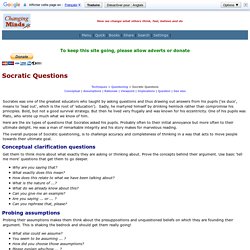

Questions. Where would I be without Twitter?

I have decided to elaborate on this AfL strategy, following this tweet from my @TeacherToolkit account on #ukedchat 3.11.11. My tweet said "#ukedchat Missed out tonight, look forward to reading ideas. My favourite T&L strategy at the moment is "Pose, Pause...Pounce, Bounce" #AfL". Firstly, this concept is not mine. So it is at this point, where I will be honourable and credit a colleague who I think has a money-spinning idea here. The fabulous Mrs Pam Fearnley delivered the session. What is it? It is a simple, yet sophisticated, AfL (Assessment for Learning) questioning technique to help teachers move from good-to-outstanding.
Why is it useful? For many reasons. The strategy encouraged teachers to take risks and tease out the "learning" in class. How does it work? I have listed the four-part approach below with additional information that I hope explains the method. . • Give the context of your approach to the class. Socratic Questioning. Techniques > Questioning > Socratic Questions Conceptual | Assumptions | Rationale | Viewpoint | Implications | Question | See also Socrates was one of the greatest educators who taught by asking questions and thus drawing out answers from his pupils ('ex duco', means to 'lead out', which is the root of 'education').

Sadly, he martyred himself by drinking hemlock rather than compromise his principles. Bold, but not a good survival strategy. But then he lived very frugally and was known for his eccentricity. Here are the six types of questions that Socrates asked his pupils. The overall purpose of Socratic questioning, is to challenge accuracy and completeness of thinking in a way that acts to move people towards their ultimate goal.
Conceptual clarification questions Get them to think more about what exactly they are asking or thinking about. Why are you saying that? Probing assumptions What else could we assume? Probing rationale, reasons and evidence. Debriefing. Ofsted 2012: Questioning to promote learning — From Good to Outstanding: Helping you to achieve outstanding and creative teaching and learning. Have you ever noticed that often, when someone is being interviewed, they say “That’s a good question.”?

It’s usually when it’s a question they can’t answer quickly and easily. Indeed, “good” questions are ones that generally need thinking about. Inspectors must consider whether: “teachers use questioning and discussion to assess the effectiveness of their teaching and promote pupils’ learning” School inspection handbook from September 2012 Notice, in this instance it does not say “ASSESS” learning, although clearly this is undeniably a major purpose for questioning. Questions that are easy to answer don’t move learning on; they might indicate that learning has happened, or that at least something has been noticed, thought about or memorised, but they don’t promote learning. How do questions promote learning? Questioning can fail because: Questioning succeeds when: What kinds of questions do you routinely ask, and how do you ask them ?
E.g. E.g. T: How might you describe a hexagon? Socratic Questions. Socrates was one of the greatest educators who taught by asking questions and thus drawing out (as ‘ex duco’, meaning to ‘lead out’, which is the root of ‘education’) answers from his pupils.

Rather stupidly, he martyred himself by drinking hemlock rather than compromise his principles. Bold, but not a good survival strategy. But then he lived very frugally and was known for his eccentricity. His pupils, by the way, include Plato and Aristotle. Plato wrote up much what we know of him. Here are the six types of questions that Socrates asked his pupils.
The overall purpose, by the way, is to challenge accuracy and completeness of thinking in a way that acts to move people towards their ultimate goal. Conceptual clarification questions Get them to think more about what exactly they are asking or thinking about. Why are you saying that? Probing assumptions Probing of assumptions makes them think about the presuppositions and unquestioned beliefs on which they are founding their argument.